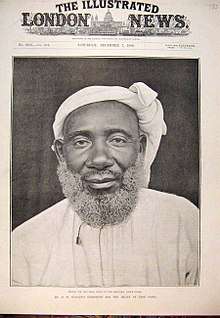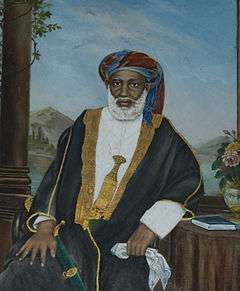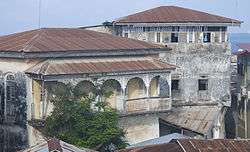Tippu Tip
Tippu Tip, or Tippu Tib (1832 – June 14, 1905), real name Hamad bin Muhammad bin Juma bin Rajab el Murjebi (Arabic: حمد بن محمد بن جمعة بن رجب بن محمد بن سعيد المرجبي), was an Afro-Arab slave trader, ivory trader, explorer, plantation owner and governor. He worked for a succession of the sultans of Zanzibar. Tippu Tip traded in slaves for Zanzibar's clove plantations. As part of the large and lucrative ivory trade, he led many trading expeditions into Central Africa, constructing profitable trading posts deep into the region. He bought the ivory from local suppliers and resold it for a profit at coastal ports.
Tippu Tip | |
|---|---|
.jpg) | |
| Born | Hamad bin Muhammad bin Juma bin Rajab el Murjebi 1832 |
| Died | June 14, 1905 (aged 77) |
| Other names | Tippu Tib |
| Occupation | Slave trader, ivory merchant, explorer, governor |
Early life

It is believed that Tippu Tip was born around 1832 on Zanzibar, based on descriptions of his age at points in his life.[1] Tippu Tip's mother, Bint Habib bin Bushir, was a Muscat Arab of the ruling class. His father and paternal grandfather were coastal Arabs of the Swahili Coast who had taken part in the earliest trading expeditions to the interior. His paternal great-grandmother, wife of Rajab bin Mohammed bin Said el Murgebi, was the daughter of Juma bin Mohammed el Nebhani, a member of a respected Muscat (Oman) family, and a Bantu woman from the village of Mbwa Maji, a small village south of what would later become the German capital of Dar es Salaam.[2]
Throughout his lifetime Hamad bin Muhammad bin Juma bin Rajab el Murjebi was more commonly known as Tippu Tib, which translates to "the gatherer together of wealth".[1] According to him, he was given the nickname Tippu Tip after the "tiptip" sound that his guns gave off during expeditions in Chungu territory.[3]
At a relatively young age, Tippu Tip led a group of about 100 men into Central Africa seeking slaves and ivory.[1] After plundering several large swathes of land he returned to Zanzibar to consolidate his resources and recruit for his forces. Following this he returned to mainland Africa.[4]
Later life

Tippu Tip built a trading empire, using the proceeds to establish clove plantations on Zanzibar. Abdul Sheriff reported that when he left for his twelve years of "empire building" on the mainland, he had no plantations of his own. By 1895, he had acquired "seven 'shambas' [plantations] and 10,000 slaves".[5]
He met and helped several famous western explorers of the African continent, including David Livingstone and Henry Morton Stanley.[6]:Vol. Two,91–97 Between 1884 and 1887 he claimed the Eastern Congo for himself and for the Sultan of Zanzibar, Bargash bin Said el Busaidi. In spite of his position as protector of Zanzibar's interests in Congo, he managed to maintain good relations with the Europeans. When, in August 1886, fighting broke out between the Swahili and the representatives of King Leopold II of Belgium at Stanley Falls, al-Murjabī went to the Belgian consul at Zanzibar to assure him of his "good intentions". Although he was still a force in Central African politics, he could see by 1886 that power in the region was shifting.
Governor of the Stanley Falls District
In early 1887, Stanley arrived in Zanzibar and proposed that Tippu Tip be made governor of the Stanley Falls District in the Congo Free State. Both Leopold and Sultan Barghash bin Said of Zanzibar agreed and on February 24, 1887, Tippu Tip accepted.[7] At the same time, he agreed to man the expedition which Stanley had been commissioned to organize for the purpose of rescuing Emin Pasha (E. Schnitzer), the German governor of Equatoria (a region of Ottoman Egypt, today in South Sudan) who had been stranded in the Bahr el Ghazal area as a result of the Mahdi uprising in Sudan.
Tippu Tip travelled back to the Upper Congo in the company of Stanley, but this time by way of the Atlantic coast and up the Congo River. Aside from its doubtful usefulness, the relief expedition was marred by the near annihilation of its rearguard, a disaster for which Stanley attempted to place the blame on Tippu Tip.
Congo–Arab War
After his tenure as governor, the Congo–Arab War broke out. Both sides fought with armies consisting mostly of local African soldiers fighting under the command of either Arab or European leaders.
When Tippu Tip left the Congo, the authority of King Leopold's Free State was still very weak in the Eastern parts of the territory and the power lay largely with local Arabic or Swahili strongmen. Amongst these were Tippu Tip's son Sefu bin Hamid and a trader known as Rumaliza in the area close to Lake Tanganyika.
In 1892, Sefu bin Hamed attacked Belgian ivory traders, who were seen as a threat to the Arab-Swahili trade. The Free State government sent a force under commander Francis Dhanis to the East. Dhanis had an early success when the African warlord Ngongo Lutete changed sides from Sefu's to his. The better armed and organised Belgian force defeated their opponents in several fights until the death of Sefu on 20 October 1893, and finally forcing also Rumaliza to flee to German territory in 1895.
Death

After returning to Zanzibar around 1890/91, Tippu Tip retired. He set out to write an account of his life, which is the first example of the literary genre of autobiography in the Bantu Swahili language. Dr. Heinrich Brode, who knew him in Zanzibar, transcribed the manuscript into Roman script and translated it into German. It was subsequently translated into English and published in Britain in 1907.[8]
Tippu Tip died June 13, 1905, of malaria (according to Brode) in his home in Stone Town, the main town on the island of Zanzibar.
References
- Hinde 1897, p. 8
- Brode, 7-8
- Ferant, Leda (1972). Tippu Tip and the East African slave trade. Hamilton. p. 42. Retrieved 24 November 2017.
For two months Tippu Tip's caravan camped in Chungu's territory and punitive parties were sent out looking for Samu and his men. According to Tippu Tip this was the time he was given his nick-name because guns went 'tiptip, in a manner too terrible to listen to'.
- Hinde 1897, p. 9
- Sheriff, 108
- Stanley, H. M., 1899, Through the Dark Continent, London: G. Newnes, Vol. One ISBN 0486256677, Vol. Two ISBN 0486256685
- Bennett and Brode
- Tippoo Tib, The story of his career in Central Africa, narrated from his own accounts by Dr. Heinrich Brode, London, Edward Arnold 1907
Sources
- Bennett, Norman Robert (1986). Arab vs. European: Diplomacy and war in Nineteenth-Century East Central Africa. New York: Africana Publishing Company.
- Elliot, Charles (1907). Preface. Tippoo Tib: The Story of His Career in Zanzibar & Central Africa. By Brode, Heinrich. Translated by Havelock, H. London: Arnold.
- Edgerton, Robert B. (2002). The Troubled Heart of Africa: A History of the Congo. New York: St. Martin's Press. ISBN 0-312-30486-2.
- Hinde, Sidney Langford (1897). The Fall of the Congo Arabs. London: Methuen & co. ISBN 978-1313986960.
- Maisha ya Hamed bin Mohammed el Murjebi yaani Tippu Tip kwa maneno yake mwenyewe, kimefasiriwa na W.H. Whitely (toleo la Kiswahili - Kiingereza), East Africa Literature Bureau 1974
- Oliver, Roland Anthony (2004). Africa since 1800. Cambridge University Press. p. 85. ISBN 0-521-83615-8.
tippu tip mother.
- Sheriff, Abdul. Slaves, Spices & Ivory in Zanzibar: Integration of an East African Commercial Empire into the World Economy, 1770-1873. London, Nairobi, Tanzania, Athens,OH: James Currey, Heinemann Kenya, Tanzania Publishing House, Ohio University Press, 1987.
External links
![]()